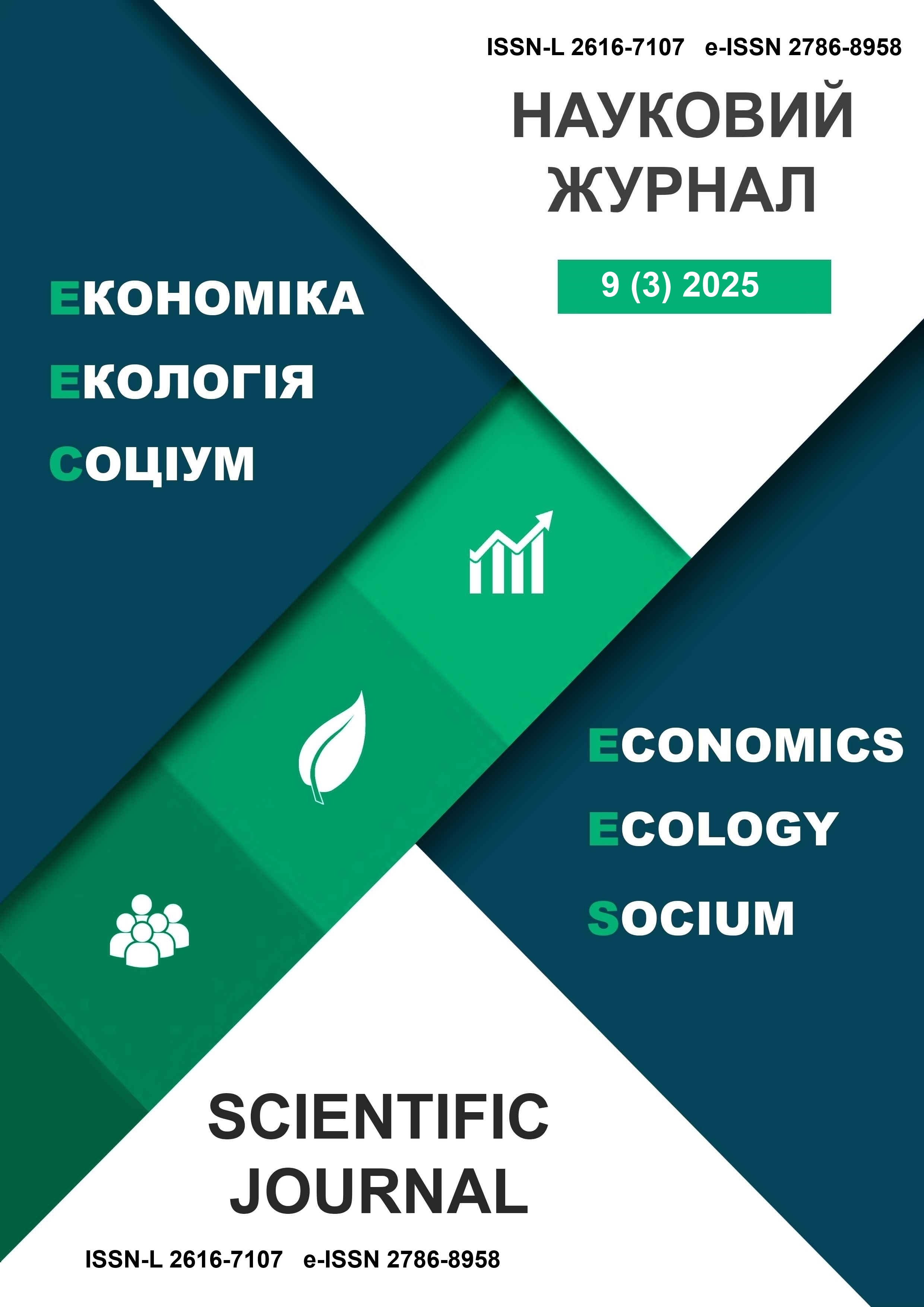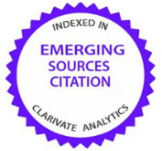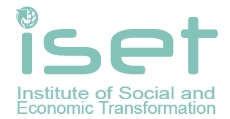Corporate Social Responsibility and Strategic Management of Business Development in Small and Medium-Sized Enterprises
Abstract
Introduction. Corporate social responsibility has recently evolved from a concept into a comprehensive, meaningful, and in-depth policy, with the help of business organisations becoming a responsible element of society. Although it enjoys increased interest at the global and European levels, corporate social responsibility (CSR) is still not a widespread practice in the policies of Bulgarian micro, small, and medium-sized enterprises.
Aim and tasks. The aim is to identify the main specific features of the implementation of CSR in Bulgarian conditions, as well as the attitudes of management towards a stronger advocacy of various CSR initiatives, both internal and external to the company.
Results. This study is based on data from a survey conducted among representatives of Bulgarian micro, small, and medium-sized enterprises operating in different sectors of the economy. The analysis of the data from a survey of 205 companies shows that CSR is perceived mainly as a tool for improving the image and meeting the expectations of customers and partners. Taking care of employees is the most common practice (45%), while initiatives aimed at the community and environment remains more limited and often episodic. Most companies do not have a formal CSR policy (41.5%), with top management leading the way in introducing CSR initiatives. It was found that attitudes towards CSR were positive. However, a lack of institutional incentives and limited resources hinders the more systematic integration of socially responsible practices. Top management (51%) initiates CSR in Bulgarian companies, making it more fragmented than strategically integrated. Most respondents (72%) see CSR as a way to improve image, but 55% consider such investments difficult to justify. The main barrier to development is the lack of government support. This pattern, where 51% of initiatives come from managers, shows that CSR is an image rather than a strategic initiative. Although companies value reputational benefits (72% for image and 67% for expected customers), only 16% have specialised CSR departments. The main obstacle remains the lack of adequate government policy, with more than 50% of respondents agreeing.
Conclusions. CSR in Bulgaria is perceived mainly as a means of building a reputation, but its practical implementation remains limited by resource and institutional factors. A trend towards strengthening internal practices and readiness for broader integration of external initiatives under the pressure of the international market and regulation. In this sense, CSR in Bulgarian enterprises can be defined as a practice in the process of institutionalisation, the development of which requires both more active management commitment and the creation of a stimulating environment at the national level.
Keywords:
Corporate Social Responsibility, SMEs, Sustainability, Strategic Management, Business Development.References
Al Masud, A., Hossain, M. T., Alamgir Hossain, M., Khairun Naher, M., & Hasan, M. M. (2025). Enhancing financial performance through corporate social responsibility: Mediating role of environmental innovation and environmental performance. Cleaner and Responsible Consumption, 17(100279), 100279. https://doi.org/10.1016/j.clrc.2025.100279
Amul, G. G. H. (2025). Corporate social responsibility as a commercial determinant of health: A case study of the alcohol industry in the Philippines. Social Science & Medicine, 380, 118169. https://doi.org/10.1016/j.socscimed.2025.118169
Angela, M., Anthony, M., Francis, E., & Damilola, A. (2021). Recent trends in corporate social responsibilities in Nigeria-A case study of major oil firms in the Niger delta region. Scientific African, 13(e00928), e00928. https://doi.org/10.1016/j.sciaf.2021.e00928
Anguelov, K., & Angelova, M. (2023). Basic principles in evaluation of fast-growing companies operating in innovation-intensive industries. Journal of Entrepreneurship and Sustainability Issues, 11(2), 299–313. https://doi.org/10.9770/jesi.2023.11.2(21)
Anguelov, K., Angelova, M. (2025). Did Bulgarian innovative business manage to cope with COVID-19 crisis – a point of view of the future generation of business managers. Entrepreneurship and Sustainability Issues, 12(3), 73-87. http://doi.org/10.9770/k4774454923
Antonova, D. (2022). Corporate Performance and Evaluation of Social Responsibility in Bulgaria. Journal of Entrepreneurship and Innovation, 14(1), 1-15.
Bakardjieva, R. (2018). Evaluating corporate social responsibility of Bulgarian firms. Bulgarian Journal of Business Research, 1, 21-37.
Boyanov, L., & Stoyanova, T. (2023). The new challenges facing the digitization of higher education institutions. 2023 VI International Conference on High Technology for Sustainable Development (HiTech), 1–4. https://doi.org/10.1109/HiTech60680.2023.10759110.
Cader, J., Koneczna, R., & Smol, M. (2022). Corporate social responsibility as a significant factor of competitive advantage - a case study of energy companies in Poland. Energy Reports, 8, 7989–8001. https://doi.org/10.1016/j.egyr.2022.06.032
Dimitrov, I., Krumova, Y., & Dimitrova, A. (2024). Research on employee success, performance, and satisfaction in the Bulgarian IT industry. Journal of Entrepreneurship and Sustainability Issues, 12(2), 295–313. https://doi.org/10.9770/j8746832232
Dimitrova, Y. (2021). Innovations and corporate social responsibility in Bulgarian SMEs. Innovations, 2, 57-68.
European Commission. (2025). Internal Market, Industry, Entrepreneurship and SMEs. Retrieved from https://single-market-economy.ec.europa.eu
Genkova, D. (2021). The concept of corporate social responsibility and the transition to sustainable development in Bulgaria – opportunities and problems& the management challenges. Leadership, Society, Strategic Visions, 211–222.
Han, B., Yang, Z., Zhou, J., & Wang, Y. (2025). How does social responsibility practice promote corporate green innovation? Based on the Mediating Effects Model of Double Chains. Innovation and Green Development, 4(1), 100197. https://doi.org/10.1016/j.igd.2024.100197
Hanaysha, J. R., Abusharbeh, M., Dwikat, S. Y., Shubita, M. F., Sharif, M. N., & Alshdaifat, S. M. (2025). Impact of corporate social responsibility, technological capability, and green entrepreneurial orientation on green innovation and sustainable performance. World Development Sustainability, 7(100233), 100233. https://doi.org/10.1016/j.wds.2025.100233
Kuo, T.-C., Chen, H.-M., & Meng, H.-M. (2021). Do corporate social responsibility practices improve financial performance? A case study of airline companies. Journal of Cleaner Production, 310(127380), 127380. https://doi.org/10.1016/j.jclepro.2021.127380
Li, Y., Jin, L., & Chen, P. (2025). The role of executive incentives and corporate social responsibility in driving corporate innovation. International Review of Financial Analysis, 102, 104109. https://doi.org/10.1016/j.irfa.2025.104109
Li, Z., & Cao, J. (2025). Enhancing green total factor productivity through corporate social responsibility: The moderating effect of environmental regulations. Finance Research Letters, 71, 106466. https://doi.org/10.1016/j.frl.2024.106466
Liu, T., & Zhou, B. (2025). Green finance policy and enterprise total factor productivity: The role of corporate environmental social responsibility and financing constraints. Journal of Cleaner Production, 493, 144953. https://doi.org/10.1016/j.jclepro.2025.144953
Morales, C. E. B., Guarín-García, A. F., Chang-Muñoz, E. A., Villanueva-Vásquez, A., Gálvez, J. F. E., Delgado, N. A. G., & Bracho, O. C. (2025). Fuzzy-Set Qualitative Comparative Analysis to Corporate Social Responsibility Components: A Case Study from Media Print Companies in Atlántico Department of Colombia. Procedia Computer Science, 257, 1148–1153. https://doi.org/10.1016/j.procs.2025.03.152
Nie, J., Song, T., & Qian, X. (2025). Does corporate social responsibility gap hinder corporate Innovation? International Review of Economics & Finance, 103, 104527. https://doi.org/10.1016/j.iref.2025.104527
Niyommaneerat, W., Suwanteep, K., & Chavalparit, O. (2023). Sustainability indicators to achieve a circular economy: A case study of renewable energy and plastic waste recycling corporate social responsibility (CSR) projects in Thailand. Journal of Cleaner Production, 391, 136203. https://doi.org/10.1016/j.jclepro.2023.136203
Rotaris, L., Scorrano, M., Campisi, B., & Rossi, P. (2023). Corporate social responsibility and passengers' behavioral intentions: A case study on railway services. Research in Transportation Business & Management, 47, 100951. https://doi.org/10.1016/j.rtbm.2023.100951
Saenz, C. (2021). The relationship between corporate social responsibility and the social licence to operate: A case study in Peru. Resources Policy, 74, 102399. https://doi.org/10.1016/j.resourpol.2021.102399
Singh, A. S., De Carli, E., Virtuoso, L. A., Segatto, A. P., & Alves, F. S. (2021). Corporate social responsibility: a case study in the company of urbanization of Curitiba. Social Responsibility Journal, 18(1), 85–105. https://doi.org/10.1108/SRJ-03-2018-0067
Stefanova, M. (2021). Bulgaria. In S. Bustamante, F. Pizzutilo, M. Martinovic, & S. Herrero Olarte (Eds.), Corporate Social Responsibility and Employer Attractiveness (pp. 85–105). Springer, Cham. https://doi.org/10.1007/978-3-030-68861-5_8
Stojanović, A., Mihajlović, I., Safronova, N. B., Kunev, S., & Schulte, P. (2021). The multi-criteria analysis of corporate social responsibility: a comparative study of Russia, Bulgaria and Serbia. Journal of Management & Organization, 27(4), 809–829. https://doi.org/10.1017/jmo.2020.40
Stoyanov, I. (2023). Methodological Approach for Impact and Prevention of Cyberbullying in Companies for Telecommunication Services. In 2023 VI International Conference on High Technology for Sustainable Development (HiTech) (pp. 1–6). IEEE. https://doi.org/10.1109/HiTech60680.2023.10759116
Sun, Y. (2025). The effect of corporate social responsibility on total factor productivity: Insights into managerial myopia and innovation mediation. Finance Research Letters, 75, 106854. https://doi.org/10.1016/j.frl.2025.106854
Yasmeen, H., & Longsheng, C. (2024). Enhancing sustainable mineral extraction through corporate social responsibility and green innovation. Journal of Cleaner Production, 477, 143884. https://doi.org/10.1016/j.jclepro.2024.143884
Zhang, J., & Leng, H. (2025). Does green innovation enhance corporate social responsibility? — Evidence from China. Finance Research Letters, 72, 106525. https://doi.org/10.1016/j.frl.2024.106525
If the article is accepted for publication in the journal «Economics. Ecology. Socium» the author must sign an agreementon transfer of copyright. The agreement is sent to the postal (original) or e-mail address (scanned copy) of the journal editions.






















